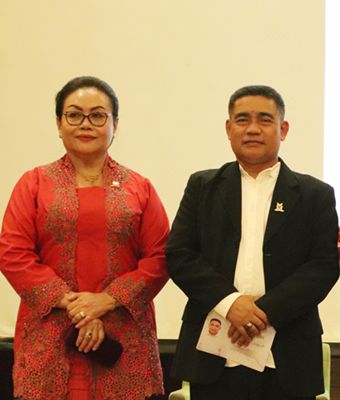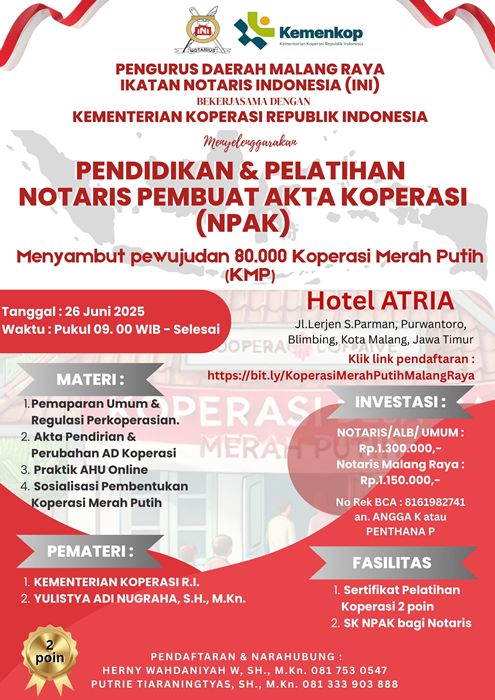Hamud M. Balfas
L a w y e r
The term bank or banks that are used and discussed in this article cover both conventional as well as sharia compliant banks (bank syariah). The term, however, does not include branches of foreign banks that are operating in Indonesia which under under Law No. 7/1992 regarding banking (as amended) is used in a more wider meaning to include both banks established under Indonesia laws or branches of foreign whose entities are not established in Indonesia.
As part of this issue, Bank Indonesia, the country central bank, as the regulator of the industry has addressed this matter for quite some time in its blue print for the Indonesia Banking Architecture. The Indonesia Banking Architecture basically has its aims to achieve the following objective namely: (i) Creating robust structures for the domestic banking system; (ii) Creating an effective system for bank regulation and supervision; (iii) Creating a strong, highly competitive banking industry; (iv) Building good corporate governance; (v) Providing a complete range of infrastructure for a healthy banking industry; and (vi) Empowerment and protection for consumers.
In light of that and in order to achieve its objectives, Bank Indonesia has on 13 July 2012 issued its Regulation No. 14/8/PBI/2012 regarding Ownership of Shares in Commercial Banks (the “Regulation 14/8”). The Regulation 14/8 basically has its aim to restrict ownership of banks by an individual shareholder either on individual shareholder basis or individuals with relationship among them.
As a follow up to Regulation 14/8, the Central Bank has on 26 December 2012 also issued Regulation No. 14/24/PBI/2012 regarding Single Ownership of Indonesian Banks (the “Regulation 14/24”) which we will also discussed below and Regulation on Multiple Licensing No. 14/26/PBI/2012 of 27 December 2012.
As part of the structuring the bank’s shareholding structures, Regulation14/8 sets forth a category of shareholders based on the following namely: (i) shareholders; and (ii) relation between the shareholders. Based on the said category, the Regulation 14/8 stipulates a general provision with respect to maximum ownership of shares in a bank for on each category, as follows:
(i) forty percent of the bank capital for category of shareholders in the form of banking financial institution (“Banks”) and non bank financial institution (“NBFI”);
(ii) thirty percent of the bank capital for category of shareholders in the form of non financial entity; and
(iii) twenty percent of the bank capital for category of shareholders in the form of individual shareholder.
The Regulation 14/8 separately also stipulates maximum ownership of shares for individual shareholders in shariah based commercial bank which it sets at twenty five percent of a bank capital.
In order to qualify as a non bank financial institution, the Regulation 14/8 stipulates that such a NBFI has to meet the following criteria, namely:
i. in its charter of incorporation, NBFI may invest in long term instruments; and
ii. it is supervised and regulated by financial services authority.
NBFI that does not meet the above criteria is treated as non financial institution entities and may only own up to 30% (thirty percent) in a bank capital.
As ownership is also seen from the relationship among shareholders, the Regulation 14/8 also stipulates that ownership in bank capital is also tied to such relationship. In light of that, the Regulation 14/8 stipulates that in the event that there are relations based on ownership, family relations or cooperation and other actions which is viewed as acting in concert either in written or otherwise, then such parties that are tied to such relationship is considered as one party in the ownership of banks.
Foreigners May Still Owned Banks
Unlike what many people expected discussion on when discussion on shares ownership on a bank started a few years ago, the Regulation 14/8 does not impose restriction on foreigners to own commercial banks in Indonesia. The Regulation 14/8 still provides equal treatment for both local and foreign investors to own banks in the country. In fact as foreign investors are considered more able to manage and operate banks, they will have more opportunity to own banks in this country than their Indonesian counterparts as the requirements to own the bank is tied to governance as well as financial soundness and capital issues, which local investors is considered to have less on that matters.
The Regulation 14/8 only imposes specific requirements for foreign shareholders to own a bank in that they have to comply with investment grade status for their financial ability and that they have to show commitment for the development of Indonesian economy as well as having a recommendation from a financial regulator in their home country. Investment grade status imposed on foreigners investors are as follows:
a. one notch above the lowest investment grade for banks;
b. two notches above the lowest investment grade for non-bank financial institutions;
c. three notches above the lowest investment grade for non financial institutions.
Upon approval of Bank Indonesia, Banks (both local and foreign) which want to invest in a bank can also exceed the forty percent ownership limit. The requirements for Banks to own more than forty percents in Indonesian banks, among others, include: (i) having a level of financial health (solvency) in the category of one (1) or two (2) from Bank Indonesia or other equivalent rating for foreign banks; (ii) meeting adequate minimum capital comparable to its risk profile; (iii) maintain a six percent tier one capital; (iv) obtains recommendation from bank regulator in its home country (for foreign banks); (v) it is a publicly owned banks; and (vi) has a commitment to own the banks for certain period of time.
Other additional requirements for Banks (both foreign and local) that would like to have more than forty percent ownership in Indonesian banks is that the acquired Indonesian banks has to float twenty percent of its shares to the public within five years after the acquisition and that the acquired banks must obtain an approval from Bank Indonesia to issue loan that are convertible to equities.
Equal treatment for foreign investors in the banking industy is also seen in other provisions in the Regulation 14/8. These provisions even extend the possibility of the foreign investors to have share ownership in the Regional Development Banks (the “Regional Banks”) which to date has practically been closed for foreign ownership. The Regulation 14/8 has reversed this and allows foreigners to own shares in the Regional Banks in the event the Regional Banks’ level of financial health and GCG assessment is downgraded to become 3, 4 and 5 and if the banks need capital injection.
The Regulation Will Impact Current Foreign Own Banks
Although the Regulation 14/8 will not affect future acquisitions of banks by foreigners, it undoubtedly will have impacts on foreigners who currently control Indonesian banks. As ownership of banks is tied to the level of its financial health and how good is the bank’s governance, ownership of current foreign shareholders owning Indonesia bank will be affected by the Regulation 14/8. Article 11 of the Regulation 14/8 is clear on this as it stipulates that: “For shareholders who owns shares in banks more than maximum ownership as stipulated in Article 2 and Article 4 (namely forty percent), they have the obligation to adjust their shareholding ownership based on the bank’s level of financial health and/or good corporate governance (“GCG”) position as assessed by end of December 2013.”
Article 12 of the Regulation 14/8 provides guidance on how the shareholding adjustment has to be made by shareholders of the banks. For shareholders in a bank that has a level of financial health and/or GCG position at level 3, 4 or 5 at the end of December 2013, an adjustment of their shareholding has to be made at the latest within five years since 1 January 2014. Although shareholders in a bank which are in the level 1 and 2 of financial health and/or GCG does not have to adjust their shareholding ownership in a bank, an adjustment must be made once their status fall below the level that requires them to adjust their shareholdings. As in the case for the shareholders that are subject to adjustment as described above, the Regulation 14/8 also imposes five years dateline for the shareholders to adjust their shareholding namely from the time their status fall below the threshold limit namely level 1 and 2.
Shareholding adjustment discussed above also applies to shareholders which acquire problem banks such as banks that are managed or saved by the Indonesian deposit insurance scheme (Lembaga Penjamin Simpanan, “LPS”); banks under special supervision; or banks that are under intensive supervision and shareholders of banks that have conducted merger. Time limit of shareholders adjustment for banks under previous condition varies depending on how the banks previous condition. For shareholder of banks that are previously managed and saved by LPS, the time limit is twenty years and fifteen years for banks that have previously been under intensive supervision by Bank Indonesia.
For banks resulting from merger, the divestment process has to follow the same route although the time frame for the divestment is longer than other banks with the same conditions. For merged banks that have pre-merger level of financial health and GCG assessment of one and two, the divestment process has to made at the latest 10 years as of: decrease of the banks level of financial health and GCG assessment to become 3, 4 and 5 in three consecutive period; or sales of shares by the shareholders which take place within a period at the latest 10 years after the merger. Whilst for merged banks that have pre-merger level of financial health and GCG assessment of within 3, 4 and 5 categories, the divestment process has to be made at the latest 20 years as of the merger.
Single Ownership Concept is Further Strengthened
As briefly discussed above, in addion to Regulation 14/8, Bank Indonesia has also issued Regulation 14/24 which has its aims to improve the competitiveness of Indonesia’s banking system in light of the regional and global levels of economic development which requires a strong and competitive banking industry.
BI considers this objective may be achieved by restructuring of bank ownership through its long term single presence policy that BI has addressed in its previous regulations. The policy is commonly known as “single presence policy” (“SPP”) and it is part of BI’s Indonesia banking architecture which aims to create a more competitive and sound banking system in the country.
As part of the SPP, the Regulation 14/24 stipulates that a party may only become a controlling shareholder in one bank. This provision only provides an exclusion for a controlling shareholder in two banks that operate under different business principles namely conventional and sharia. It also excludes controlling shareholders in two banks, where one of the banks is a joint venture bank namely a bank established as a joint between foreign and local shareholder. The Regulation 14/24 stipulates of what it considers as a controlling as a party that controls 25% or more shares, or in the event the party own less that such a threshold percentage, such a party has direct or indirect control over the bank.
Further, the Regulation 14/24 in its Article 3 stipulates that controlling shareholders that operate in two banks are obliged to conduct a restructuring of ownership either in form of a merger or consolidation, establish a bank holding company, or establish a holding function. The restructuring in the form of merger and establishing a holding company must be implemented within one year after the Regulation enters into force. Whilst for a restructuring in the form of holding function must be carried out within six months.
BI provides banks with incentive in the event that a controlling shareholder chooses to restructuring in the form of merger and consolidation. The forms of incentives provided by BI are as follows: (i) extension of time to comply with compulsory minimum reserves (Giro Wajib Minimum); (ii) extension for the settlement of legal lending limit; (iii) facilitation in opening branch offices, and/or (iv) temporary facilitation in implementing of Good Corporate Governance.
As for controlling shareholders that opt to transfer all of their shares into a bank holding company, the Regulation requires that a holding company must be formed as Indonesian Limited Liability Company that is established in accordance with the Indonesian Law. The holding company is a separate company which cannot engage in banking activities but may serve as financial holding company that can have control over its activities in other financial institutions.
Hamud M. Balfas is a lawyer with Ali Budiardjo Nugroho Reksodiputro (ABNR) in Jakarta, Indonesia. He may be contacted at: [email protected]. Hamud writes articles on various subject of the law extensively (www.abnrlaw.com). He is also an author of a book on Indonesian Capital Market (Hukum Pasar Modal Indonesia), now in its second edition.






Tinggalkan komentar